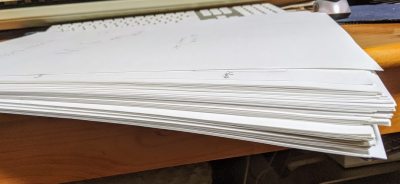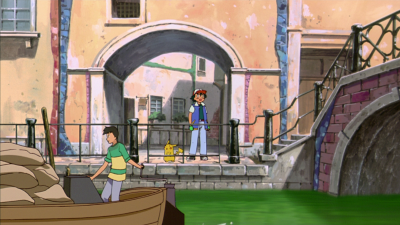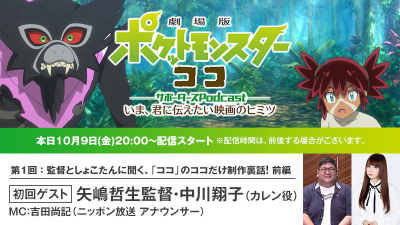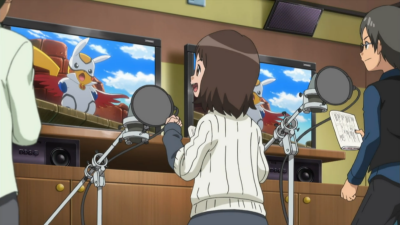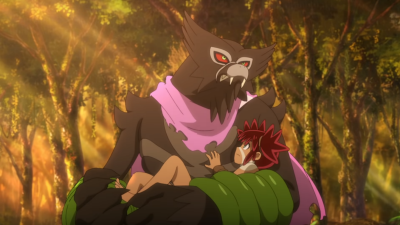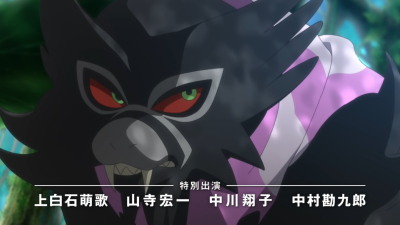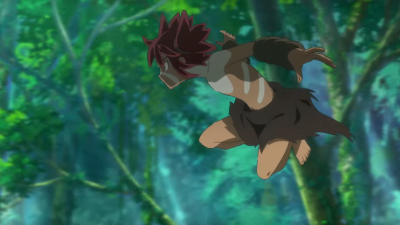
The Movie "Koko"
Supporters' Podcast



Main
Old Updates Archive
Links
 |
Lists |
List of Pokemon
Pokemon World Atlas
List of Techniques
List
of Items
List of TV Episodes
 |
Guides |
Episode
Comparisons
Movies
& Specials Guide
CD Guide
DVD Guide
Voice
Actors Guide
Lyrics Archive
Manga Guide
Video Games
 |
Miscellaneous |
Humor
Pokemon Bashing
Features
Rants
Dogasu's
Backpack
| Movies & Specials Guide | Koko

The sixth episode of Pocket Monsters The Movie "Koko" Supporters' Podcast - "The Movie Secrets We Want to Tell You" (劇場版ポ ケットモンスター ココ -サポーターズPodcastーいま、君に伝えたい映画のヒミツ) was released on Friday, November 20th, 2020.
You can listen to the podcast here, though do be aware that the episode is completely in Japanese.
Host: Mr. Hisanori Yoshida (吉田尚記)
Special Guest: The film's sound director, Mr. Masafumi Mima (三間雅文)
Special Guest: Music Composer Mr. Shinji Miyazaki (宮崎慎二)
The podcast host, Mr. Hisanori Yoshida, has been watching animation for a long time. Why does he like it so much? Well one, he just finds it really super interesting. Two, because he's really enthralled by how everything you see on-screen was put there on purpose. In live action the camera will sometimes accidentally pick something up it didn't intend to, but with animation if there's something on the screen then that means someone had to go in, on purpose, and draw it. The more down the rabbit hole you get with animation, he concludes, the more interesting it becomes.
Welcome to the Pocket Monsters The Movie "Koko" Supporters' Podcast - "The Movie Secrets We Want to Tell You"! This is a podcast that takes a deep dive into the making of the Pocket Monsters films like the one coming out December 25th, 2020, Pocket Monsters The Movie "Koko." Today's episode is a continuation of the chat they had the previous week with the film's sound director, Mr. Masafumi Mima, and its music composer, Mr. Shinji Miyazaki. The podcast host introduces his guests as two old men who are a lot alike. Mr. Mima's an old man full of life, he says, while Mr. Miyazaki is an old man who's also an intellectual. This description catches Mr. Miyazaki off-guard, causing everyone to laugh.
So, continuing on from last time, they're going to talk about the document Mr. Mima uses to order music - his "love letter," as he puts it - from Mr. Miyazaki. The title of this document is the "Music Menu" (音 楽メニュー). It's a document that Mr. Mima has put together based on the director's storyboards, and its purpose it to take the overall sound blueprint he has in mind for the film and put that into words so that Mr. Miyazaki will be able to understand what the movie should sound like. Mr. Miyazaki then takes this document and uses it as the basis to start composing the music for the film.
Mr. Yoshida tells the audience that Mr. Miyazaki has brought sheet music in with him today. This sheet music, which Mr. Mima had apparently not seen before, is for Pocket Monsters The Movie "Koko" but Mr. Miyazaki can't say too much about it without giving away spoilers. Mr. Yoshida comments that he's brought about ten sheets of 8 ¼ x 11 ¾ size paper with him. Mr. Yoshida reads out the title of one of the pieces of music, "2020 Pokémon M-36 "Koko"." But that doesn't tell us much, he says, so we need to find a different example.
So instead, they'll talk through the Music Menu from the movie from two years ago, Pocket Monsters The Movie "Everyone's Story." The track they'll talk about today is one with an internal catalog number of "M-45" called "Battle! vs Zeraora." Mr. Yoshida reads Mr. Mima's comments from the document:
The podcast host is shocked at just how detailed these notes are. Are they all like this, Mr. Miyazaki? Sometimes, the composer responds, but other times they might really need a piece of music to be a certain way and so Mr. Mima's notes will be even more detailed than that. Remember, this document is written for Mr. Miyazaki's sake and so Mr. Mima anticipates what kinds of questions Mr. Miyazaki will have for him -- based on the 20+ years they've been working together, no doubt -- and then makes sure to include those details in the document. Mr. Miyazaki is thankful for Mr. Mima being so accommodating. Mr. Yoshida flips through the document and sees that all these written comments are for a song that lasts over three minutes. Mr. Miyazaki confirms this, adding that this is the longest single piece of music in the entire film. It's used for the scene where Satoshi and Zeraora battle, sure, but it's also the scene where we see the connection between what the mayor's doing, and shows Lisa and her running, shows how all the other characters in the film are all connected, etc.
Mr. Miyazaki usually fills in the sheet music by hand (Mr. Yoshida confirms that the other pages are indeed handwritten) but because this was the longest piece of music in the film, and because this document was made so late in production, that writing out everything by hand would have caused them to miss their deadline. So he asked a friend to help him print out the sheet music. Mr. Yoshida reckons there's about ten pages of sheet music and thousands and thousands of notes for just this one song here, though of course he knows that the number of notes in any given song doesn't really indicate how long the actual song will be.
The podcast then segues into a section where the composer talks about the role of music in motion pictures. Mr. Miyazaki says that film scores have several purposes. It used to be that movies would start with the title screen, all of a sudden, followed by the list of the actors who appear in the film. But most modern films, Pokémon included, aren't made like that anymore. Instead, there's usually some kind of cold opening, some action scenes maybe, and then after a little while the title screen comes up. The music in those cold opening scenes is used to set the location, or the time period, or the country the characters are in, etc. Mr. Yoshida interjects, saying "like if you have a bunch of Eastern-sounding instruments playing then you feel like the movie takes place in Japan." Yes, that's exactly it, Mr. Miyazaki replies.
He then goes on to say that if the visuals are just of some wilderness somewhere then you need to use music to tell the audience where that wilderness is or what time period we're looking at. Mr. Yoshida says that if you put urgent-sounding music to the footage then that makes you think some enemy is closing in; but if you take those same images and put peaceful music over them instead then that tells the audience that they can relax. So music really plays a big role in setting the stage for the film.
Music is also used to guide the audience to the emotions being felt at any given moment. Let's say you have a scene with a boy and a girl, or even an old man and an old woman, and they're talking happily to the people around them. Now, let's say that the story behind that particular scene is that the two characters' happiness is all a facade and that they're actually deeply troubled about something. The visuals alone can't convey that information all at once and so somber music may be used to tell the audience that, for example, this man right here is worried about something. If the film does what it's supposed to then the music doesn't dictate to the viewer what to feel, but instead pulls them into that direction naturally.
There are also directors who like to use music as a tool to really surprise their audience. Taken Steven Spielberg's 1975 film Jaws, for example. There's that scene where everyone's happily swimming in the water, all having a great time. But! Over that happy footage we also have the John Williams Jaws theme telling us that, actually, something terrible is about to happen. The visuals and the music are telling us two different things, basically. That's a great case study for what he's talking about, Mr. Miyazaki says. If you didn't have that musical build up in the scene then the shark's violent attack later on just becomes this random jump scare. Some directors might want to do that, of course, but others prefer to use the music to help build up to the action instead.
So now that we know what the music is to be used for, how do they actually go about putting it into the scene? With live action movies, background music is added in after principal photography is all done to amplify the performances of the actors they were able to catch on film. But with Pokémon (and Japanese animation in general), they don't have those performances to work off of until near the very end of production. They get about a year or two to make an animated Japanese film, you see, and the schedules during that time production period is very, very tight. So they really have no choice but to compose the music off the storyboards.
The sound director is an integral part of this process. Now let's suppose Mr. Miyazaki were to go up to the film's director himself and ask a question about a scene in the storyboards. He might get a reply that answers his question, sure, but he might also get a reply like "ah, well, it's kind of hard for me to explain without the finished footage." And so Mr. Miyazaki, as a composer, would have no choice but to just sit tight for a while. But that's a waste of time, so the sound director comes in and works with both the director and the music composer to figure out some way to at least get some work done in the meantime. Without the sound director helping to facilitate everything, Mr. Miyazaki says, they probably wouldn't be able to finish the music on time.
Mr. Yoshida wonders if, once the visuals are done, Mr. Miyazaki's conversations with the film's director would be any more successful. But even in that case, Mr. Miyazaki says, it'd probably be too late for the director to really change anything. So it all has to be done based on the storyboards. Sometimes even that doesn't always work, though, because sometimes they'll see the finished full-color footage and realize that oops, we should have gone in this direction instead of the one we took. They work with the film's story seared into their heads, you see, and they get so laser-focused on making the music they might end up forgetting basic things like a scene's setting. The movie's still being animated at this point, after all. And so sometimes, they may create music for a scene set on a cliff but then the animation comes back and they see that it was actually supposed to be set in a mountain instead. But those kinds of things rarely happen anymore.
Mr. Mima chimes in to say that thanks to the delay of this year's film, Koko, they've been given more time to work on the score and so their focus right now is to really fine tune everything. Mr. Miyazaki says he listened to the episodes of this podcast that featured the film's director Tetsuo Yajima and "Shokotan" and how they talked about the schedule for Pocket Monsters The Movie "Everyone's Story" being so tight. In an effort to provide a better schedule this time around, Mr. Miyazaki says, two writers from Everyone's Story and one of the writers from the video games came together with Mr. Miyazaki to form a four-person team where they all use their combined experiences to create the soundtrack to this year's film. If you're one of those people who's like "not again!" when they heard that Mr. Miyazaki was in charge of the music for this film, then don't worry; the soundtrack to this film is going to have a cool, completely fresh sound to it.
The conversation turns to Mr. Mima and the voice actors. Mr. Yoshida starts by telling listeners that Mr. Mima doesn't have the actors on call 24/7, of course; they schedule the actors to come in for 7-8 hours at a time, for example, and Mr. Mima has to figure out how to get everything he needs from the actors within those limits. So it must be a completely different type of struggle from what the composer goes through right? Well, Mr. Mima responds, not necessarily. Mr. Miyazaki is the conductor for when they actually sit down and record the soundtrack, after all, and so he also only has a set amount of time in the studio. Both their jobs are surprisingly similar in that regard. They both have to create a drama with the people they've gathered in a limited amount of time.
The podcast host starts to talk about the pre-production work, before anyone sets foot into any studio. In the previous podcast episode Mr. Mima mentioned that he directed the Koko actors to act as though they're wild animals in a jungle, ready to run for it at any moment. Mr. Mima adds that this was something the director of the movie came up with. He then invites the podcast host to think about the differences between dogs in the wild and dogs you keep in your home as pets. They bark loudly when they've spotted an enemy but keep quiet when they're on guard, right? Especially if they're small and don't want to attract the attention of a larger animal. The wild animals in a jungle aren't going to bark the same way domesticated animals in a comparatively safe country like Japan are going to, he reasons, so he had to figure out a way to direct Mr. Kankuro Nakamura (Zarude's voice actor) and the other actors in a way to help make that difference clear.
Did you say any of this to the actors before they stepped into the booth, or on the day of, Mr. Yoshida asks. He told them the day of, Mr. Mima replies. So the actors had the script beforehand and probably did their own preparation themselves, but sometimes all that prep work they did clashed with what the director of the film wanted. And so Mr. Mima would have to tell the actors "Well, let's try this, let's try standing in front of the mic this way, and saying this line this other way," little by little. "Mr. Nakamura, you're coming off as a little afraid here, let's try it again sounding more like you're ready to protect Koko." Things like that.
The podcast host brings up something else he thinks is incredibly important. He was able to see a little bit of the movie script and he says that while Pokémon do not speak Japanese, of course, there are notes in the script that indicate what it is they're actually saying. The script might say something like "waaah!" but the script will indicate that the Pokémon are really saying "run for it!" Mr. Mima interjects and talks about how it's like there are two "cameras" that are "filming" their movies: one that catches the Pokémon language dialogue and another one that catches the humans' dialogue. And that for their movies, in his mind, they keep switching back and forth between the two. From Satoshi's "camera," Zarude's speech just sounds like a bunch of animal noises, but from Zarude's "camera" we can hear him say "Koko, today you haven't bla bla bla." Mr. Mima believes this way of thinking is really interesting but admits that it's really difficult for Mr. Nakamura and Ms. Moka Kamishiraishi (Koko's voice actor) and the other voice actors. They were all really good sports about it, though.
It doesn't seem like Mr. Mima understood the question Mr. Yoshida was asking so he decides to read an example of what he's talking about. The following is written in parentheses inside the Koko script:
After hearing this example Mr. Mima finally understands what Mr. Yoshida's getting at. This is true in both the movies and the TV series, but when Pikachu talks, for example, we just hear it say "Pika, Pikachu." But that's not what it's actually saying; it's really saying something like "You got a Pokémon!" or "Satoshi." So, the writers put translations of what the Pokémon are actually saying in parentheses to make it easier for the actors to figure out how to perform their characters. Mr. Mima then goes over those scripts with these translations added in and decides if they're going to be easy enough for the actors to understand. The podcast host believes this is an incredible skill to have, but Mr. Mima doesn't believe it's all that impressive. Think about it like a pet dog or cat you might have in your home. We don't understand dog language or cat language, of course, but we can sort of figure out if they're hungry and want food based on the way they bark, for example.
He shares these translations with the director - Mr. Yuyama or Mr. Yajima or whoever - to confirm that he's not misinterpreting anything. Sometimes he's right, and sometimes he's not. For example, maybe there's a scene where the Pokémon is supposed to be happy but there's something about its performance that makes it sound sad instead. It should be saying "Waaaa!" with a happy sound to it but instead it's saying "Waaaa!" while sounding a bit sad. So how do you write that in the script to make that more clear?
Mr. Yoshida comments that this all seems extremely hard on the actors and well, Mr. Mima says, it is. But it's important to have actors who understand the hearts of animals...or, in this case, Pokémon. Otherwise you just get performances where the actors are mindlessly repeating random syllables - "zaku zaku zaku zaku zaku zaku" - without any rhyme or reason. During auditions, Mr. Mima says, he has actors read scripts with these descriptions in them to see whether or not the actors can understand what it's like to play a Pokémon. Back to the "interpreter" analogy from the previous episode, Mr. Yoshida reckons that having humans come in to play Pokémon is like having a foreigner who doesn't speak Japanese come in to read for a Japanese show. If the actor can stick with it and learn the language - Pokémon language, Japanese, whatever - then it won't matter that they're not fluent in the language in the end.
The direction the actors are looking in also has an impact on the actors' performances. Mr. Mima mentions that in the jungle setting of the film, everyone's speaking from high up in the trees. Zarude and Koko spend a lot of the movie up there, you see. In the recording studio, they usually have the TVs right at the actors' eye levels so they can watch the footage as they're dubbing the film, and as a result the actors tend to perform looking straight ahead. But their characters aren't speaking to characters directly in front of them, right? So the sound team figured that if you tilt your head up or down, or if you change the distance between yourself and the mic, etc. then that will affect the way the voice sounds even if everything else -- say, the volume at which you're speaking -- is exactly the same.
Mr. Yoshida comments that he heard of a study that found that humans can tell the slight differences between the sound of cold water being poured and the sound of warm water being poured. Warm water just has this viscousness to its sound, you know? Or, the sound of water splashing in a swimming pool vs. water splashing in a bathtub. The same principle applies to voice acting. If we close our eyes and listen to someone speaking to us we can work out if the person is located above us, or under us, or directly in front of us, or behind us. So Mr. Mima took care to direct his actors - Mr. Nakamura and Ms. Kamishiraishi - of where to look so that they're performing as if they're actually inside the world of the screen instead of just performing at a TV screen in front of them.
An example of this is a scene where Koko's falling from someplace high. Most actors would maybe just scream "Aaaaaah!" and call it a day but Mr. Mima wanted more out of his actor. So he asked her the following:
And then, just like that, Ms. Kamishiraishi was able to deliver the performance he wanted. Mr. Yoshida is amazed at this; to be able to follow those directions is of course amazing, to be sure, but to think up of these things in the first place is truly amazing. But if you take the time to really think about it then it's not that hard, Mr. Mima says. Of course there are the restrictions of mouth flaps and whatnot to keep track of, Mr. Mima says. But it'd be a waste for Ms. Kamishiraishi to not give the performance she's capable of even with all those restrictions in mind.
Sound directors like Mr. Mima bring the sound to a film, of course, but in the case of Pokémon they're also bringing the Pokémon world to life as a whole. Certain actors, like Megumi Hayashibara, are really great at bringing the Pokémon to life, so much so that they're referred to as "beast masters." Mr. Mima compares the film's director to the ringleader of a circus, with the actors being the lions and elephants and whatnot. The world of Pocket Monsters The Movie "Koko" is like a circus, just set in a jungle. And just like in a circus, the sound director sits above his performers, guiding them -- in this case, telling them to look in a certain direction as they speak into the microphone -- to make their performances come to life. Mr. Mima adds that the actors who are able to really understand this and adapt to change are the ones who are the most interesting to work with. But he goes on to say that all the actors are pros working against a deadline, and so all of them are amazing.
Mr. Yoshida then segues into a segment of the podcast he calls "Here is What We Want to Know About Koko! Koko Question!" (コ コのココが知りたい「ココ・クエスチョン」). It's the part of the podcast where they read some of the questions that were asked on Twitter using the hashtag #ココバナ toward the end of October. Today's question comes to us from someone who goes by ni (に):
Question: "Which of the many songs you've made up until now stick out to you? For me, it's the guitar arrangement of Advance Adventure as well as Oracion."
Answer: Mr. Yoshida asks Mr. Mima how he guides Mr. Miyazaki to make a song in whatever way he wants. Mr. Mima responds that he leaves it all up to Mr. Miyazaki. He doesn't give him orders like "use a guitar in this song" or anything like that; he leaves it up to the professional he's asked to create this work. A song like Oracion? That's all Miyazaki, he says. It's better if he doesn't try to push his ideas onto his artists, Mr. Mima says, or give too much praise. The reason for this last one is because if he gets into the habit of saying "oh, that track here was really cool!" then it turns into this whole thing where it's like "Well alright, how about this one? And this one? Isn't this one cool as well?"
But to answer the question, Mr. Mima says he really likes Mewtwo's leitmotif in Pocket Monsters The Movie "Mewtwo Strikes Back!" It's a really great song, first and foremost, and it lets the audience know that Mewtwo's about to do something cool. But he couldn't express any of this admiration to Mr. Miyazaki at the time and so he just went "OK, good job. Next." It's not good for morale for him to play favorites, you see, and it also helps prevent artists from getting too comfortable. Mr. Yoshida compares it to someone who's involved in two films, one that's a hit and one that's not. Box office bombs don't necessarily require any less work, y'know. The work that person does for each film is going to be pretty much the same regardless of the eventual public perception.
What about Mr. Miyazaki? Are there any songs that he either really liked or any songs that stand out to him because they were really tough? In last year's film, Mewtwo Strikes Back Evolution, the song with the internal catalog number M-05 was the music used for the title screen in the original Mewtwo Strikes Back! from 23 years ago. That's the song where music composed by Mr. Junichi Masuda for the video games is sandwiched in between original music that Mr. Miyazaki created. He remembers the Movie 1 production period as being extremely hectic, so much so that he wondered if they could finish the movie in time. But they did, and when he went to the theater and heard this song come up he started getting a bit misty eyed.
At that same showing, a little boy was sitting beside Mr. Miyazaki. He noticed that the little boy started crying when the movie started; Mr. Miyazaki figured that maybe this was the kid's first time ever in a movie theater, and he wasn't used to the bigger-than-life sound? Whatever the case, when that dark-sounding Mewtwo theme that Mr. Mima mentioned before started playing, the little boy began to cry "I wanna go hooooome!" And so he was taken out of the theater. Mr. Miyazaki was left wondering what in the world he had gotten himself into, he says with a laugh.
But yeah, probably the piece of music that leaves the biggest impression on Mr. Miyazaki is the music used during the movies' title screens. There are more than 20 variations of the song by this point. Mr. Mima adds that the way the titles appear on the screen changes every year so it's really interesting for him, as a listener, to see how Mr. Miyazaki re-arranges that M-05 song to make it fit the animation of the current year's movie title.
It's time to wrap up the podcast! The next episodes will be Episode 07, which comes out on Friday December 4th, and Episode 08, which comes out December 11th, and the special guests will be Satoshi's voice actor, Ms.. Rica Matsumoto, and Dr. Zed's voice actor, Mr. Kou'ichi Yamadera! Both actors have been in all 23 Pocket Monsters movies so they'll be sure to have a lot to say! Mr. Yoshida reminds listeners that they can follow the film's official Twitter account for up-to-the-minute news on this podcast. Pocket Monsters The Movie "Koko" comes out Friday, December 25th. Pre-order tickets, which include serial codes for the Mythical Pokémon Zarude and Celebi, are on-sale now.
This time, Mr. Miyazaki is asked to leave us with some parting words:
Shinji Miyazaki: I don't have anything to leave you with! (everyone laughs) I mentioned this earlier, but a team of four of us came together to make the music for this film. I think we made music with a really fresh sound to it so please look forward to it!
And now, Mr. Mima:
Masafumi Mima: We're still hard at work on this acclaimed movie. This movie can be enjoyed as a family as well, and we made it so that the little kids won't cry (everyone laughs). We made a movie that's fun, cute, and with parts that are maybe just a little bit sad, but we think at the end of the day you'll leave the theater with a smile on your face so please look forward to it.
The podcast host thanks his guests and, after everyone signs off, they all say goodbye.

The sixth episode of Pocket Monsters The Movie "Koko" Supporters' Podcast - "The Movie Secrets We Want to Tell You" (劇場版ポ ケットモンスター ココ -サポーターズPodcastーいま、君に伝えたい映画のヒミツ) was released on Friday, November 20th, 2020.
You can listen to the podcast here, though do be aware that the episode is completely in Japanese.
| Release / General Information |
| Release Date |
November 30th, 2020 |
| Runtime | 37 minutes, 25 seconds |
| Episode Link |
Listen
to the episode here |
| Cast |
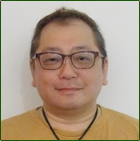 |
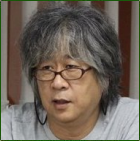 |
Host: Mr. Hisanori Yoshida (吉田尚記)
Special Guest: The film's sound director, Mr. Masafumi Mima (三間雅文)
Special Guest: Music Composer Mr. Shinji Miyazaki (宮崎慎二)
| Episode Six |
The podcast host, Mr. Hisanori Yoshida, has been watching animation for a long time. Why does he like it so much? Well one, he just finds it really super interesting. Two, because he's really enthralled by how everything you see on-screen was put there on purpose. In live action the camera will sometimes accidentally pick something up it didn't intend to, but with animation if there's something on the screen then that means someone had to go in, on purpose, and draw it. The more down the rabbit hole you get with animation, he concludes, the more interesting it becomes.
Welcome to the Pocket Monsters The Movie "Koko" Supporters' Podcast - "The Movie Secrets We Want to Tell You"! This is a podcast that takes a deep dive into the making of the Pocket Monsters films like the one coming out December 25th, 2020, Pocket Monsters The Movie "Koko." Today's episode is a continuation of the chat they had the previous week with the film's sound director, Mr. Masafumi Mima, and its music composer, Mr. Shinji Miyazaki. The podcast host introduces his guests as two old men who are a lot alike. Mr. Mima's an old man full of life, he says, while Mr. Miyazaki is an old man who's also an intellectual. This description catches Mr. Miyazaki off-guard, causing everyone to laugh.
So, continuing on from last time, they're going to talk about the document Mr. Mima uses to order music - his "love letter," as he puts it - from Mr. Miyazaki. The title of this document is the "Music Menu" (音 楽メニュー). It's a document that Mr. Mima has put together based on the director's storyboards, and its purpose it to take the overall sound blueprint he has in mind for the film and put that into words so that Mr. Miyazaki will be able to understand what the movie should sound like. Mr. Miyazaki then takes this document and uses it as the basis to start composing the music for the film.
Mr. Yoshida tells the audience that Mr. Miyazaki has brought sheet music in with him today. This sheet music, which Mr. Mima had apparently not seen before, is for Pocket Monsters The Movie "Koko" but Mr. Miyazaki can't say too much about it without giving away spoilers. Mr. Yoshida comments that he's brought about ten sheets of 8 ¼ x 11 ¾ size paper with him. Mr. Yoshida reads out the title of one of the pieces of music, "2020 Pokémon M-36 "Koko"." But that doesn't tell us much, he says, so we need to find a different example.
So instead, they'll talk through the Music Menu from the movie from two years ago, Pocket Monsters The Movie "Everyone's Story." The track they'll talk about today is one with an internal catalog number of "M-45" called "Battle! vs Zeraora." Mr. Yoshida reads Mr. Mima's comments from the document:
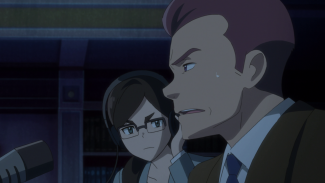 |
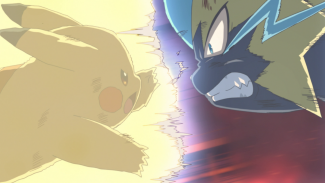 |
| "A
battle to connect the hearts and minds of Satoshi and Zeraora.
Modulation at C134 1,349. Starting with the mayor, everyone's feelings
and situations begin to change. From C-1,408 the battle starts up
again. A sense of urgency, blue. Open parenthesis, scene. Cut. Um...the
explosion scene from cut 1,424 makes an impactful hit." サトシとゼ ラオラの心を繋ぐためのバトル。えっ、C-134…あ、1,349だ。で、転調。で、その気持ちと共に市長はじめとするみんなの気持ちと状況が好転しはじ めた。C-1408から再びバトルへ。緊迫感、青って。かこ、シーン。え、カットだ。カット1424の爆発が好打替わり。 |
The podcast host is shocked at just how detailed these notes are. Are they all like this, Mr. Miyazaki? Sometimes, the composer responds, but other times they might really need a piece of music to be a certain way and so Mr. Mima's notes will be even more detailed than that. Remember, this document is written for Mr. Miyazaki's sake and so Mr. Mima anticipates what kinds of questions Mr. Miyazaki will have for him -- based on the 20+ years they've been working together, no doubt -- and then makes sure to include those details in the document. Mr. Miyazaki is thankful for Mr. Mima being so accommodating. Mr. Yoshida flips through the document and sees that all these written comments are for a song that lasts over three minutes. Mr. Miyazaki confirms this, adding that this is the longest single piece of music in the entire film. It's used for the scene where Satoshi and Zeraora battle, sure, but it's also the scene where we see the connection between what the mayor's doing, and shows Lisa and her running, shows how all the other characters in the film are all connected, etc.
Mr. Miyazaki usually fills in the sheet music by hand (Mr. Yoshida confirms that the other pages are indeed handwritten) but because this was the longest piece of music in the film, and because this document was made so late in production, that writing out everything by hand would have caused them to miss their deadline. So he asked a friend to help him print out the sheet music. Mr. Yoshida reckons there's about ten pages of sheet music and thousands and thousands of notes for just this one song here, though of course he knows that the number of notes in any given song doesn't really indicate how long the actual song will be.
The podcast then segues into a section where the composer talks about the role of music in motion pictures. Mr. Miyazaki says that film scores have several purposes. It used to be that movies would start with the title screen, all of a sudden, followed by the list of the actors who appear in the film. But most modern films, Pokémon included, aren't made like that anymore. Instead, there's usually some kind of cold opening, some action scenes maybe, and then after a little while the title screen comes up. The music in those cold opening scenes is used to set the location, or the time period, or the country the characters are in, etc. Mr. Yoshida interjects, saying "like if you have a bunch of Eastern-sounding instruments playing then you feel like the movie takes place in Japan." Yes, that's exactly it, Mr. Miyazaki replies.
He then goes on to say that if the visuals are just of some wilderness somewhere then you need to use music to tell the audience where that wilderness is or what time period we're looking at. Mr. Yoshida says that if you put urgent-sounding music to the footage then that makes you think some enemy is closing in; but if you take those same images and put peaceful music over them instead then that tells the audience that they can relax. So music really plays a big role in setting the stage for the film.
Music is also used to guide the audience to the emotions being felt at any given moment. Let's say you have a scene with a boy and a girl, or even an old man and an old woman, and they're talking happily to the people around them. Now, let's say that the story behind that particular scene is that the two characters' happiness is all a facade and that they're actually deeply troubled about something. The visuals alone can't convey that information all at once and so somber music may be used to tell the audience that, for example, this man right here is worried about something. If the film does what it's supposed to then the music doesn't dictate to the viewer what to feel, but instead pulls them into that direction naturally.
There are also directors who like to use music as a tool to really surprise their audience. Taken Steven Spielberg's 1975 film Jaws, for example. There's that scene where everyone's happily swimming in the water, all having a great time. But! Over that happy footage we also have the John Williams Jaws theme telling us that, actually, something terrible is about to happen. The visuals and the music are telling us two different things, basically. That's a great case study for what he's talking about, Mr. Miyazaki says. If you didn't have that musical build up in the scene then the shark's violent attack later on just becomes this random jump scare. Some directors might want to do that, of course, but others prefer to use the music to help build up to the action instead.
So now that we know what the music is to be used for, how do they actually go about putting it into the scene? With live action movies, background music is added in after principal photography is all done to amplify the performances of the actors they were able to catch on film. But with Pokémon (and Japanese animation in general), they don't have those performances to work off of until near the very end of production. They get about a year or two to make an animated Japanese film, you see, and the schedules during that time production period is very, very tight. So they really have no choice but to compose the music off the storyboards.
The sound director is an integral part of this process. Now let's suppose Mr. Miyazaki were to go up to the film's director himself and ask a question about a scene in the storyboards. He might get a reply that answers his question, sure, but he might also get a reply like "ah, well, it's kind of hard for me to explain without the finished footage." And so Mr. Miyazaki, as a composer, would have no choice but to just sit tight for a while. But that's a waste of time, so the sound director comes in and works with both the director and the music composer to figure out some way to at least get some work done in the meantime. Without the sound director helping to facilitate everything, Mr. Miyazaki says, they probably wouldn't be able to finish the music on time.
Mr. Yoshida wonders if, once the visuals are done, Mr. Miyazaki's conversations with the film's director would be any more successful. But even in that case, Mr. Miyazaki says, it'd probably be too late for the director to really change anything. So it all has to be done based on the storyboards. Sometimes even that doesn't always work, though, because sometimes they'll see the finished full-color footage and realize that oops, we should have gone in this direction instead of the one we took. They work with the film's story seared into their heads, you see, and they get so laser-focused on making the music they might end up forgetting basic things like a scene's setting. The movie's still being animated at this point, after all. And so sometimes, they may create music for a scene set on a cliff but then the animation comes back and they see that it was actually supposed to be set in a mountain instead. But those kinds of things rarely happen anymore.
Mr. Mima chimes in to say that thanks to the delay of this year's film, Koko, they've been given more time to work on the score and so their focus right now is to really fine tune everything. Mr. Miyazaki says he listened to the episodes of this podcast that featured the film's director Tetsuo Yajima and "Shokotan" and how they talked about the schedule for Pocket Monsters The Movie "Everyone's Story" being so tight. In an effort to provide a better schedule this time around, Mr. Miyazaki says, two writers from Everyone's Story and one of the writers from the video games came together with Mr. Miyazaki to form a four-person team where they all use their combined experiences to create the soundtrack to this year's film. If you're one of those people who's like "not again!" when they heard that Mr. Miyazaki was in charge of the music for this film, then don't worry; the soundtrack to this film is going to have a cool, completely fresh sound to it.
The conversation turns to Mr. Mima and the voice actors. Mr. Yoshida starts by telling listeners that Mr. Mima doesn't have the actors on call 24/7, of course; they schedule the actors to come in for 7-8 hours at a time, for example, and Mr. Mima has to figure out how to get everything he needs from the actors within those limits. So it must be a completely different type of struggle from what the composer goes through right? Well, Mr. Mima responds, not necessarily. Mr. Miyazaki is the conductor for when they actually sit down and record the soundtrack, after all, and so he also only has a set amount of time in the studio. Both their jobs are surprisingly similar in that regard. They both have to create a drama with the people they've gathered in a limited amount of time.
The podcast host starts to talk about the pre-production work, before anyone sets foot into any studio. In the previous podcast episode Mr. Mima mentioned that he directed the Koko actors to act as though they're wild animals in a jungle, ready to run for it at any moment. Mr. Mima adds that this was something the director of the movie came up with. He then invites the podcast host to think about the differences between dogs in the wild and dogs you keep in your home as pets. They bark loudly when they've spotted an enemy but keep quiet when they're on guard, right? Especially if they're small and don't want to attract the attention of a larger animal. The wild animals in a jungle aren't going to bark the same way domesticated animals in a comparatively safe country like Japan are going to, he reasons, so he had to figure out a way to direct Mr. Kankuro Nakamura (Zarude's voice actor) and the other actors in a way to help make that difference clear.
Did you say any of this to the actors before they stepped into the booth, or on the day of, Mr. Yoshida asks. He told them the day of, Mr. Mima replies. So the actors had the script beforehand and probably did their own preparation themselves, but sometimes all that prep work they did clashed with what the director of the film wanted. And so Mr. Mima would have to tell the actors "Well, let's try this, let's try standing in front of the mic this way, and saying this line this other way," little by little. "Mr. Nakamura, you're coming off as a little afraid here, let's try it again sounding more like you're ready to protect Koko." Things like that.
The podcast host brings up something else he thinks is incredibly important. He was able to see a little bit of the movie script and he says that while Pokémon do not speak Japanese, of course, there are notes in the script that indicate what it is they're actually saying. The script might say something like "waaah!" but the script will indicate that the Pokémon are really saying "run for it!" Mr. Mima interjects and talks about how it's like there are two "cameras" that are "filming" their movies: one that catches the Pokémon language dialogue and another one that catches the humans' dialogue. And that for their movies, in his mind, they keep switching back and forth between the two. From Satoshi's "camera," Zarude's speech just sounds like a bunch of animal noises, but from Zarude's "camera" we can hear him say "Koko, today you haven't bla bla bla." Mr. Mima believes this way of thinking is really interesting but admits that it's really difficult for Mr. Nakamura and Ms. Moka Kamishiraishi (Koko's voice actor) and the other voice actors. They were all really good sports about it, though.
It doesn't seem like Mr. Mima understood the question Mr. Yoshida was asking so he decides to read an example of what he's talking about. The following is written in parentheses inside the Koko script:
| "We were doing just fine until those jerks
showed up." アイツらが 来てあっという間に荒らしちまったんだったく |
After hearing this example Mr. Mima finally understands what Mr. Yoshida's getting at. This is true in both the movies and the TV series, but when Pikachu talks, for example, we just hear it say "Pika, Pikachu." But that's not what it's actually saying; it's really saying something like "You got a Pokémon!" or "Satoshi." So, the writers put translations of what the Pokémon are actually saying in parentheses to make it easier for the actors to figure out how to perform their characters. Mr. Mima then goes over those scripts with these translations added in and decides if they're going to be easy enough for the actors to understand. The podcast host believes this is an incredible skill to have, but Mr. Mima doesn't believe it's all that impressive. Think about it like a pet dog or cat you might have in your home. We don't understand dog language or cat language, of course, but we can sort of figure out if they're hungry and want food based on the way they bark, for example.
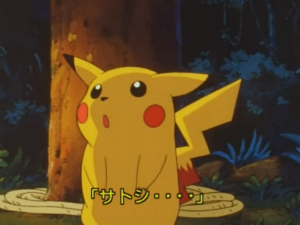 |
He shares these translations with the director - Mr. Yuyama or Mr. Yajima or whoever - to confirm that he's not misinterpreting anything. Sometimes he's right, and sometimes he's not. For example, maybe there's a scene where the Pokémon is supposed to be happy but there's something about its performance that makes it sound sad instead. It should be saying "Waaaa!" with a happy sound to it but instead it's saying "Waaaa!" while sounding a bit sad. So how do you write that in the script to make that more clear?
Mr. Yoshida comments that this all seems extremely hard on the actors and well, Mr. Mima says, it is. But it's important to have actors who understand the hearts of animals...or, in this case, Pokémon. Otherwise you just get performances where the actors are mindlessly repeating random syllables - "zaku zaku zaku zaku zaku zaku" - without any rhyme or reason. During auditions, Mr. Mima says, he has actors read scripts with these descriptions in them to see whether or not the actors can understand what it's like to play a Pokémon. Back to the "interpreter" analogy from the previous episode, Mr. Yoshida reckons that having humans come in to play Pokémon is like having a foreigner who doesn't speak Japanese come in to read for a Japanese show. If the actor can stick with it and learn the language - Pokémon language, Japanese, whatever - then it won't matter that they're not fluent in the language in the end.
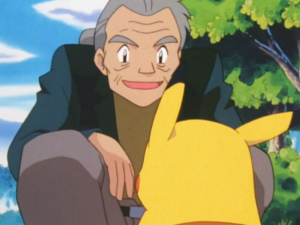 |
The direction the actors are looking in also has an impact on the actors' performances. Mr. Mima mentions that in the jungle setting of the film, everyone's speaking from high up in the trees. Zarude and Koko spend a lot of the movie up there, you see. In the recording studio, they usually have the TVs right at the actors' eye levels so they can watch the footage as they're dubbing the film, and as a result the actors tend to perform looking straight ahead. But their characters aren't speaking to characters directly in front of them, right? So the sound team figured that if you tilt your head up or down, or if you change the distance between yourself and the mic, etc. then that will affect the way the voice sounds even if everything else -- say, the volume at which you're speaking -- is exactly the same.
Mr. Yoshida comments that he heard of a study that found that humans can tell the slight differences between the sound of cold water being poured and the sound of warm water being poured. Warm water just has this viscousness to its sound, you know? Or, the sound of water splashing in a swimming pool vs. water splashing in a bathtub. The same principle applies to voice acting. If we close our eyes and listen to someone speaking to us we can work out if the person is located above us, or under us, or directly in front of us, or behind us. So Mr. Mima took care to direct his actors - Mr. Nakamura and Ms. Kamishiraishi - of where to look so that they're performing as if they're actually inside the world of the screen instead of just performing at a TV screen in front of them.
An example of this is a scene where Koko's falling from someplace high. Most actors would maybe just scream "Aaaaaah!" and call it a day but Mr. Mima wanted more out of his actor. So he asked her the following:
Mima: "Ms. Kamishiraishi,
what did you
see as you were falling?"
Kamishiraishi: "Um...I saw the drawings on the screen."
Mima: "Now let's imagine that you're falling in real life. What would you see as you're falling from the trees?"
Kamishiraishi: "The sky...?"
Mima: "OK, then scream as if you're reaching your hand out to the sky as if to say "help me!""
Kamishiraishi: "Um...I saw the drawings on the screen."
Mima: "Now let's imagine that you're falling in real life. What would you see as you're falling from the trees?"
Kamishiraishi: "The sky...?"
Mima: "OK, then scream as if you're reaching your hand out to the sky as if to say "help me!""
And then, just like that, Ms. Kamishiraishi was able to deliver the performance he wanted. Mr. Yoshida is amazed at this; to be able to follow those directions is of course amazing, to be sure, but to think up of these things in the first place is truly amazing. But if you take the time to really think about it then it's not that hard, Mr. Mima says. Of course there are the restrictions of mouth flaps and whatnot to keep track of, Mr. Mima says. But it'd be a waste for Ms. Kamishiraishi to not give the performance she's capable of even with all those restrictions in mind.
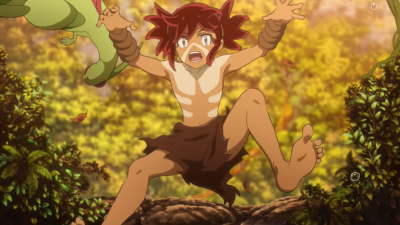 |
Sound directors like Mr. Mima bring the sound to a film, of course, but in the case of Pokémon they're also bringing the Pokémon world to life as a whole. Certain actors, like Megumi Hayashibara, are really great at bringing the Pokémon to life, so much so that they're referred to as "beast masters." Mr. Mima compares the film's director to the ringleader of a circus, with the actors being the lions and elephants and whatnot. The world of Pocket Monsters The Movie "Koko" is like a circus, just set in a jungle. And just like in a circus, the sound director sits above his performers, guiding them -- in this case, telling them to look in a certain direction as they speak into the microphone -- to make their performances come to life. Mr. Mima adds that the actors who are able to really understand this and adapt to change are the ones who are the most interesting to work with. But he goes on to say that all the actors are pros working against a deadline, and so all of them are amazing.
Mr. Yoshida then segues into a segment of the podcast he calls "Here is What We Want to Know About Koko! Koko Question!" (コ コのココが知りたい「ココ・クエスチョン」). It's the part of the podcast where they read some of the questions that were asked on Twitter using the hashtag #ココバナ toward the end of October. Today's question comes to us from someone who goes by ni (に):
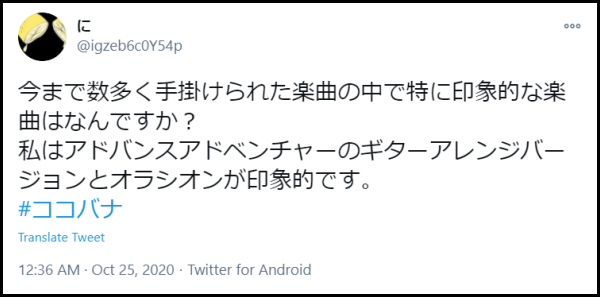 |
| Listeners
could submit questions up until October 25th, 2020 by using the hashtag
#ココバナ |
Question: "Which of the many songs you've made up until now stick out to you? For me, it's the guitar arrangement of Advance Adventure as well as Oracion."
Answer: Mr. Yoshida asks Mr. Mima how he guides Mr. Miyazaki to make a song in whatever way he wants. Mr. Mima responds that he leaves it all up to Mr. Miyazaki. He doesn't give him orders like "use a guitar in this song" or anything like that; he leaves it up to the professional he's asked to create this work. A song like Oracion? That's all Miyazaki, he says. It's better if he doesn't try to push his ideas onto his artists, Mr. Mima says, or give too much praise. The reason for this last one is because if he gets into the habit of saying "oh, that track here was really cool!" then it turns into this whole thing where it's like "Well alright, how about this one? And this one? Isn't this one cool as well?"
But to answer the question, Mr. Mima says he really likes Mewtwo's leitmotif in Pocket Monsters The Movie "Mewtwo Strikes Back!" It's a really great song, first and foremost, and it lets the audience know that Mewtwo's about to do something cool. But he couldn't express any of this admiration to Mr. Miyazaki at the time and so he just went "OK, good job. Next." It's not good for morale for him to play favorites, you see, and it also helps prevent artists from getting too comfortable. Mr. Yoshida compares it to someone who's involved in two films, one that's a hit and one that's not. Box office bombs don't necessarily require any less work, y'know. The work that person does for each film is going to be pretty much the same regardless of the eventual public perception.
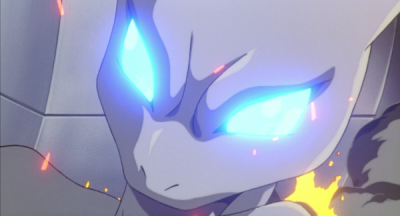 |
What about Mr. Miyazaki? Are there any songs that he either really liked or any songs that stand out to him because they were really tough? In last year's film, Mewtwo Strikes Back Evolution, the song with the internal catalog number M-05 was the music used for the title screen in the original Mewtwo Strikes Back! from 23 years ago. That's the song where music composed by Mr. Junichi Masuda for the video games is sandwiched in between original music that Mr. Miyazaki created. He remembers the Movie 1 production period as being extremely hectic, so much so that he wondered if they could finish the movie in time. But they did, and when he went to the theater and heard this song come up he started getting a bit misty eyed.
At that same showing, a little boy was sitting beside Mr. Miyazaki. He noticed that the little boy started crying when the movie started; Mr. Miyazaki figured that maybe this was the kid's first time ever in a movie theater, and he wasn't used to the bigger-than-life sound? Whatever the case, when that dark-sounding Mewtwo theme that Mr. Mima mentioned before started playing, the little boy began to cry "I wanna go hooooome!" And so he was taken out of the theater. Mr. Miyazaki was left wondering what in the world he had gotten himself into, he says with a laugh.
But yeah, probably the piece of music that leaves the biggest impression on Mr. Miyazaki is the music used during the movies' title screens. There are more than 20 variations of the song by this point. Mr. Mima adds that the way the titles appear on the screen changes every year so it's really interesting for him, as a listener, to see how Mr. Miyazaki re-arranges that M-05 song to make it fit the animation of the current year's movie title.
 |
It's time to wrap up the podcast! The next episodes will be Episode 07, which comes out on Friday December 4th, and Episode 08, which comes out December 11th, and the special guests will be Satoshi's voice actor, Ms.. Rica Matsumoto, and Dr. Zed's voice actor, Mr. Kou'ichi Yamadera! Both actors have been in all 23 Pocket Monsters movies so they'll be sure to have a lot to say! Mr. Yoshida reminds listeners that they can follow the film's official Twitter account for up-to-the-minute news on this podcast. Pocket Monsters The Movie "Koko" comes out Friday, December 25th. Pre-order tickets, which include serial codes for the Mythical Pokémon Zarude and Celebi, are on-sale now.
This time, Mr. Miyazaki is asked to leave us with some parting words:
Shinji Miyazaki: I don't have anything to leave you with! (everyone laughs) I mentioned this earlier, but a team of four of us came together to make the music for this film. I think we made music with a really fresh sound to it so please look forward to it!
And now, Mr. Mima:
Masafumi Mima: We're still hard at work on this acclaimed movie. This movie can be enjoyed as a family as well, and we made it so that the little kids won't cry (everyone laughs). We made a movie that's fun, cute, and with parts that are maybe just a little bit sad, but we think at the end of the day you'll leave the theater with a smile on your face so please look forward to it.
The podcast host thanks his guests and, after everyone signs off, they all say goodbye.
| Previous
Episode |
Next
Episode |
Back to the page for
Pocket Monsters The Movie "Koko" Supporters' Podcast - "The Movie Secrets We Want to Tell You"
Pocket Monsters The Movie "Koko" Supporters' Podcast - "The Movie Secrets We Want to Tell You"
Found an error? Spot an omission? Please help me keep this page current and error-free by e-mailing me with a description of the error or omission.


